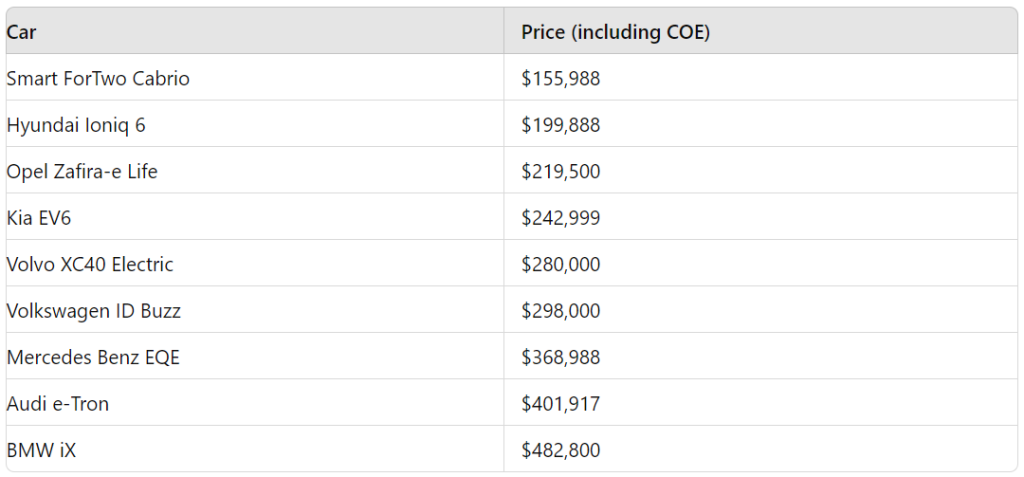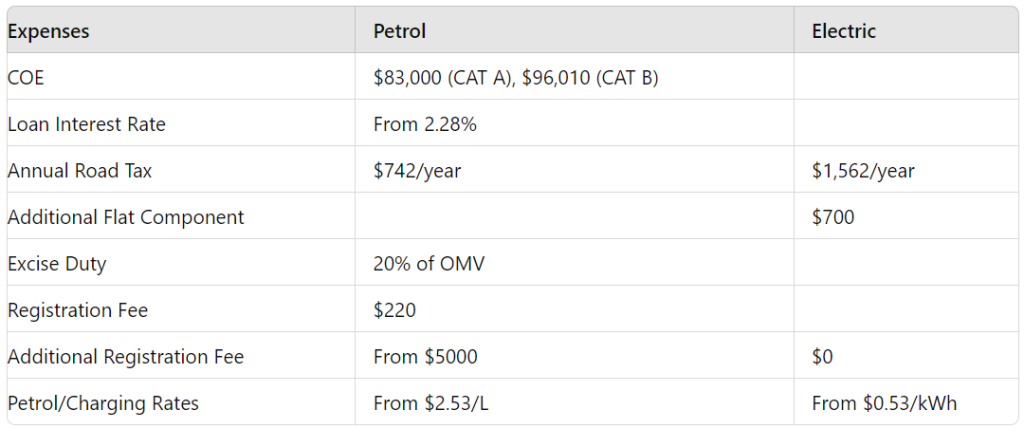
Electric vehicles (EVs) are gaining traction in Singapore, spurred by the arrival of Tesla and rising interest in sustainable transport. Here’s a comprehensive guide on the feasibility, costs, types, and infrastructure of electric vehicles in Singapore.
Table of Contents
TL;DR
- Electric Vehicles Singapore: Growing interest and government support.
- Cost: Comparable upfront costs, long-term savings on fuel and maintenance.
- Types: All-electric vehicles (EVs), hybrid electric vehicles (HEVs), and plug-in hybrid electric vehicles (PHEVs).
- Convenience: Increasing charging infrastructure, yet still limited.
- Environmental Impact: Significant reduction in carbon emissions and noise pollution.
- Future Outlook: Singapore aims for 100% cleaner energy vehicles by 2040.
Why Consider Electric Vehicles in Singapore?
With rising COE prices, owning a car in Singapore is challenging. However, the appeal of electric vehicles is growing, especially with government incentives like a rebate of up to $15,000 for new EV registrations until 31st December 2024. By 2030, Singapore plans to phase out new registrations of internal combustion engine (ICE) cars, making EVs a forward-thinking choice.
Types of Electric Vehicles
Electric vehicles in Singapore fall into three categories:
- All-Electric Vehicles (EVs): Fully electric, no petrol usage.
- Hybrid Electric Vehicles (HEVs): Combine petrol engines with electric motors.
- Plug-In Hybrid Electric Vehicles (PHEVs): Hybrid vehicles with rechargeable batteries.
This guide focuses on all-electric vehicles, offering insights into their efficiency, range, and charging needs.
Cost Comparison: Electric Vehicles vs. Petrol-Powered Cars
Upfront Costs
Here are some popular electric vehicles in Singapore and their prices, including COE:

Electric vehicle prices are comparable to traditional cars, but long-term costs offer significant savings.
Long-Term Costs
Cost Breakdown:

While EVs have a higher annual road tax, they benefit from lower fuel and maintenance costs. Charging a 42kWh battery costs significantly less than filling a petrol tank, and maintenance expenses are reduced due to fewer mechanical parts.
Renting Electric Vehicles
Not ready to buy? Consider renting. BlueSG offers an electric car-sharing service at $0.36 per minute, with membership plans starting from $8 per month.
Charging Infrastructure in Singapore
Singapore’s EV charging infrastructure is expanding, with over 6,000 charging points currently available and plans for 60,000 by 2030. Major companies like Shell and SP are increasing their charging stations across various locations.
Environmental Benefits
Switching to electric vehicles significantly reduces carbon emissions and noise pollution. EVs emit half the carbon dioxide of ICEs, contributing to cleaner air. If all vehicles in Singapore were electric, carbon emissions could reduce by 1.5-2 million tonnes.
Should You Switch to an Electric Vehicle?
Electric vehicles offer substantial long-term savings and environmental benefits. However, the current charging infrastructure still poses challenges. EV ownership is more feasible for those with home charging options. As Singapore progresses towards its goal of 100% cleaner energy vehicles by 2040, the infrastructure will likely improve, making EV ownership more convenient.
Conclusion
Driving electric vehicles in Singapore presents numerous advantages, including cost savings and environmental benefits. While the current infrastructure is developing, ongoing efforts promise a more EV-friendly future. If you’re ready to invest in sustainable transport, now is a great time to consider an electric vehicle.












